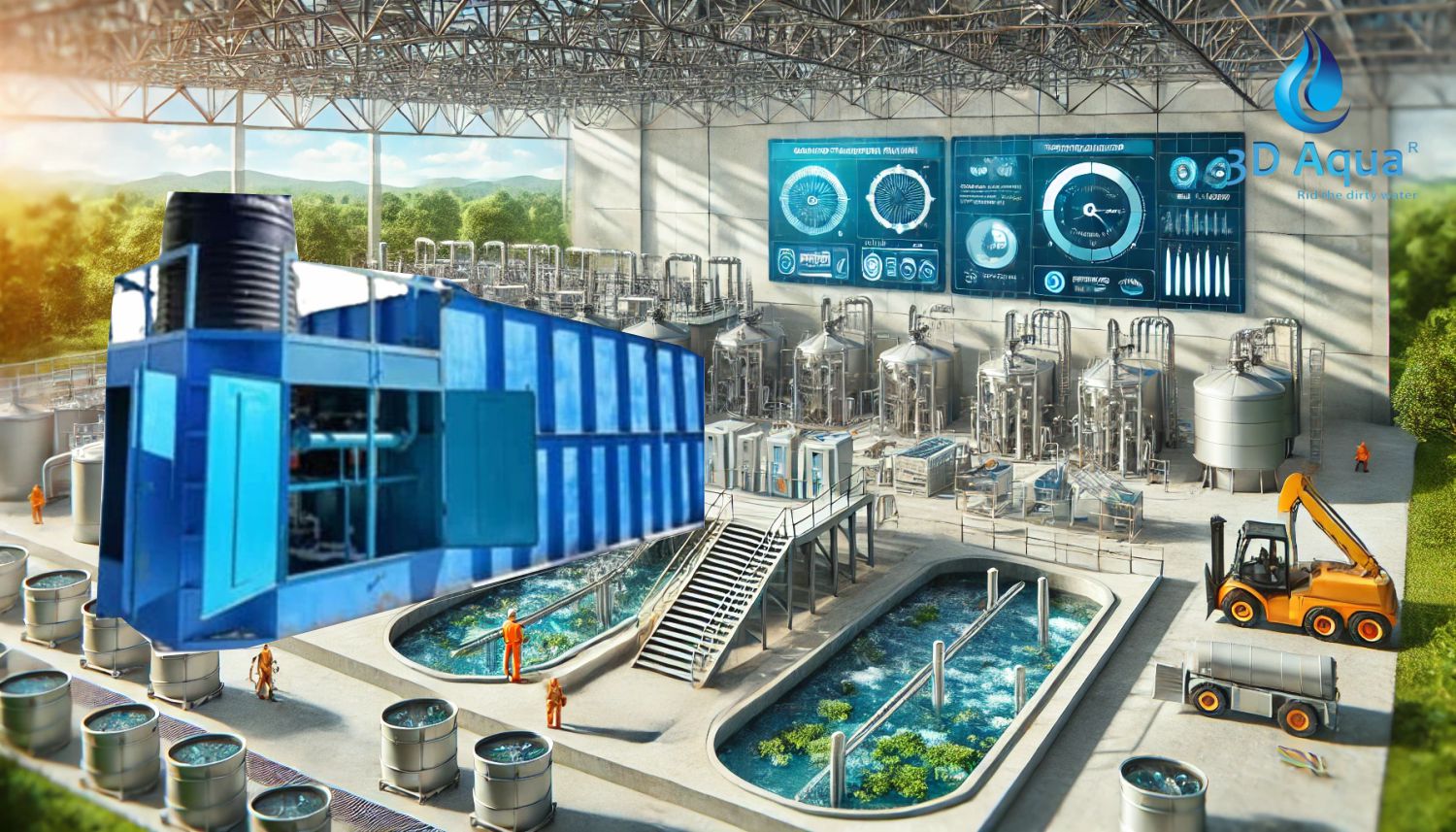A Sewage Treatment Plant (STP) plays a crucial role in treating wastewater and ensuring that clean, safe water is released into the environment. Enhancing STP efficiency is vital to reducing operational costs, minimizing environmental impacts, and maintaining optimal performance. By implementing strategic measures, STP plants can achieve higher efficiency, improved effluent quality, and lower maintenance requirements.
In this comprehensive guide, we will explore effective methods to boost the efficiency of sewage treatment plants and explain why 3D Aqua Water Treatment Company is the best choice for STP solutions.
Key Strategies to Enhance Sewage Treatment Plant Efficiency
1. Routine Maintenance and Monitoring
Regular maintenance and constant monitoring are fundamental for improving STP efficiency. Over time, equipment wear and tear, sensor clogging, and sludge accumulation can lead to inefficiencies. Timely detection and resolution of such issues ensure smooth operation.
How to Maintain an STP Effectively?
- Conduct regular inspections of pumps, aerators, and valves.
- Check for pipe blockages, leaks, and filter damages.
- Ensure all meters and sensors are correctly calibrated and functioning optimally.
- Schedule periodic cleaning to prevent excessive sludge buildup.
Benefits of Regular Maintenance:
- Prevents unexpected system failures and downtime.
- Ensures consistent effluent quality and regulatory compliance.
- Extends the lifespan of STP components, reducing long-term costs.
2. Optimizing Aeration Systems
Aeration plays a key role in biological treatment, promoting the breakdown of organic matter. By optimizing aeration efficiency, STPs can reduce energy consumption and enhance wastewater treatment.
Best Practices for Aeration Optimization:
- Adjust air supply based on the actual oxygen demand.
- Use energy-efficient blowers and diffusers to minimize power usage.
- Implement automated aeration control systems to ensure proper oxygen levels.
Advantages of an Optimized Aeration System:
- Reduces energy costs while maintaining effective treatment.
- Enhances biological processes, leading to improved effluent quality.
- Lowers operational costs through efficient oxygen utilization.
3. Effective Sludge Management
Sludge accumulation is inevitable in wastewater treatment, but poor sludge handling can lead to inefficiencies and increased operational costs. Proper sludge management enhances plant efficiency and prevents environmental pollution.
How to Improve Sludge Management?
- Remove excess sludge regularly to maintain process efficiency.
- Utilize advanced dewatering techniques to minimize sludge volume.
- Implement sludge digestion or stabilization to generate biogas or compost.
Why Effective Sludge Management Matters?
- Reduces waste disposal costs and environmental footprint.
- Enhances plant efficiency and sustainability.
- Supports resource recovery through biogas production.
4. Upgrading Treatment Technologies
Older STP systems may lack efficiency, making technological upgrades essential for better treatment capacity, lower energy consumption, and improved effluent quality.
How to Modernize an STP?
- Integrate advanced filtration technologies such as membrane bioreactors (MBR) or moving bed biofilm reactors (MBBR).
- Implement UV sterilization and advanced oxidation processes for superior disinfection.
- Utilize real-time monitoring and automation to optimize treatment processes.
Impact of Upgrading STP Systems:
- Enhances compliance with stringent environmental regulations.
- Improves treatment quality while lowering operational costs.
- Future-proofs the system with scalable, modular solutions.
5. Optimizing Chemical Usage
Chemical dosing is necessary for wastewater treatment, but excessive use can lead to inefficiencies, high costs, and environmental harm.
Ways to Optimize Chemical Dosing:
- Conduct frequent water quality analysis to determine accurate chemical needs.
- Implement automated dosing systems to minimize human error.
- Choose eco-friendly chemicals to reduce the environmental impact.
Advantages of Controlled Chemical Usage:
- Reduces chemical costs and operational expenses.
- Ensures consistent and effective treatment processes.
- Enhances sustainability and minimizes toxic discharge.
6. Staff Training and Knowledge Enhancement
A well-trained workforce is critical to ensuring seamless plant operation and improving efficiency.
Best Practices for Staff Training:
- Conduct regular training sessions on STP operations and best practices.
- Educate personnel on environmental regulations and treatment quality standards.
- Encourage employees to report issues promptly for early resolution.
How Training Benefits STP Operations?
- Reduces operational errors and enhances plant performance.
- Promotes proactive maintenance, reducing the likelihood of system failures.
- Ensures compliance with environmental and safety regulations.
How 3D Aqua Water Treatment Company Enhances STP Efficiency
As a leading STP manufacturer, 3D Aqua Water Treatment Company provides advanced, customized wastewater treatment solutions to improve STP performance and efficiency.
Why Choose 3D Aqua?
✅ Tailored STP Solutions: We design plants to meet your specific treatment needs, ensuring maximum efficiency.
✅ Cutting-Edge Technology: Our plants incorporate high-efficiency aeration, advanced filtration, and energy-saving features.
✅ Sustainable and Energy-Efficient Systems: We focus on reducing power consumption while maximizing treatment effectiveness.
✅ Reliable Maintenance Support: Our team provides ongoing service and support to ensure long-term system reliability.
✅ Expert Consultation: Our professionals offer guidance on STP optimization, upgrades, and compliance.
By choosing 3D Aqua Water Treatment Company, you invest in a high-performance, reliable, and sustainable STP designed to meet modern wastewater treatment challenges.
Conclusion
Enhancing Sewage Treatment Plant efficiency is crucial for lowering operational costs, meeting environmental standards, and ensuring high-quality effluent. By implementing routine maintenance, optimizing aeration, upgrading technologies, managing sludge effectively, and training staff, STPs can achieve greater efficiency and sustainability.
3D Aqua Water Treatment Company is committed to delivering state-of-the-art STP solutions that maximize efficiency, reduce costs, and support environmental conservation. Contact us today to explore customized STP solutions for your wastewater treatment needs.
📍 Address: 3D Aqua Water Treatment Company, Noida and Delhi Based Company
📞 Phone: +91 626262 9090
📧 Email: info@3daqua.com
🌐 Website: www.3daqua.com
Let 3D Aqua Water Treatment Company help you achieve a more efficient, cost-effective, and sustainable sewage treatment system!

